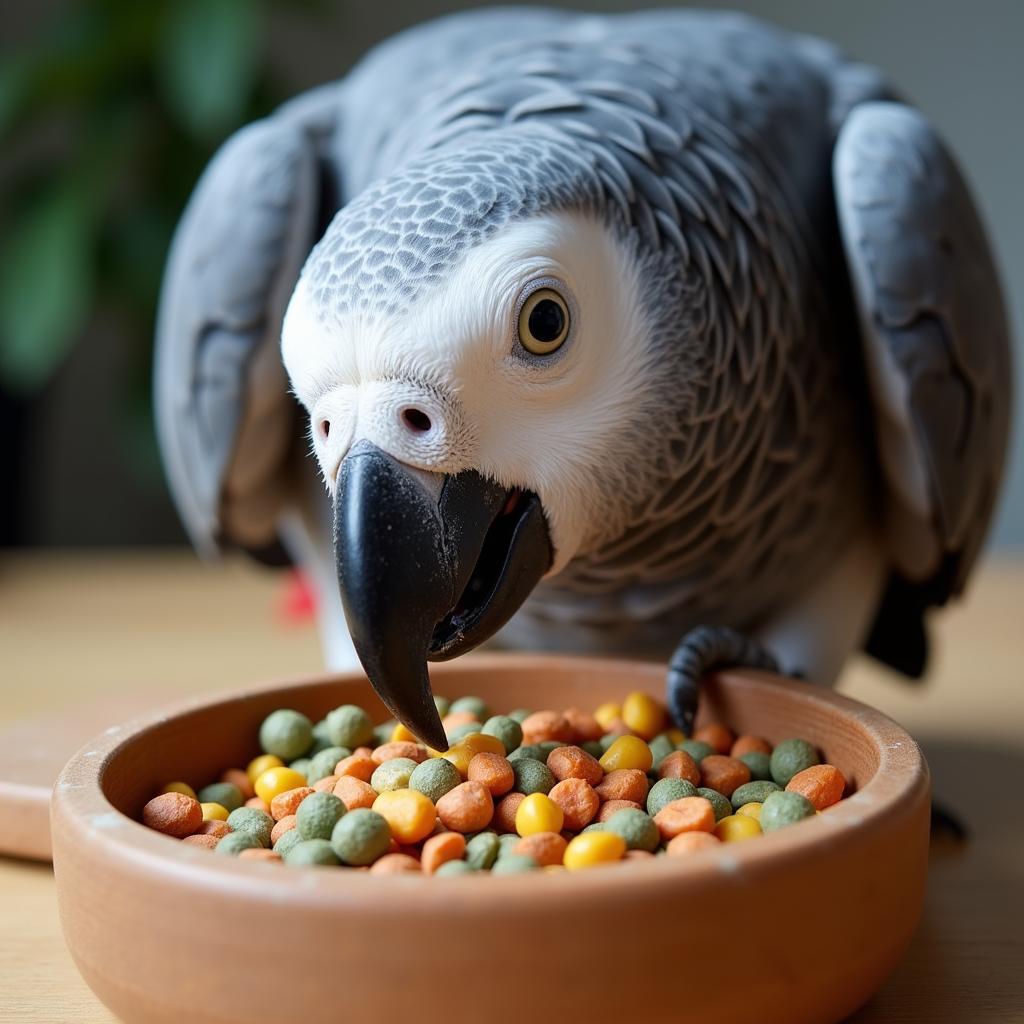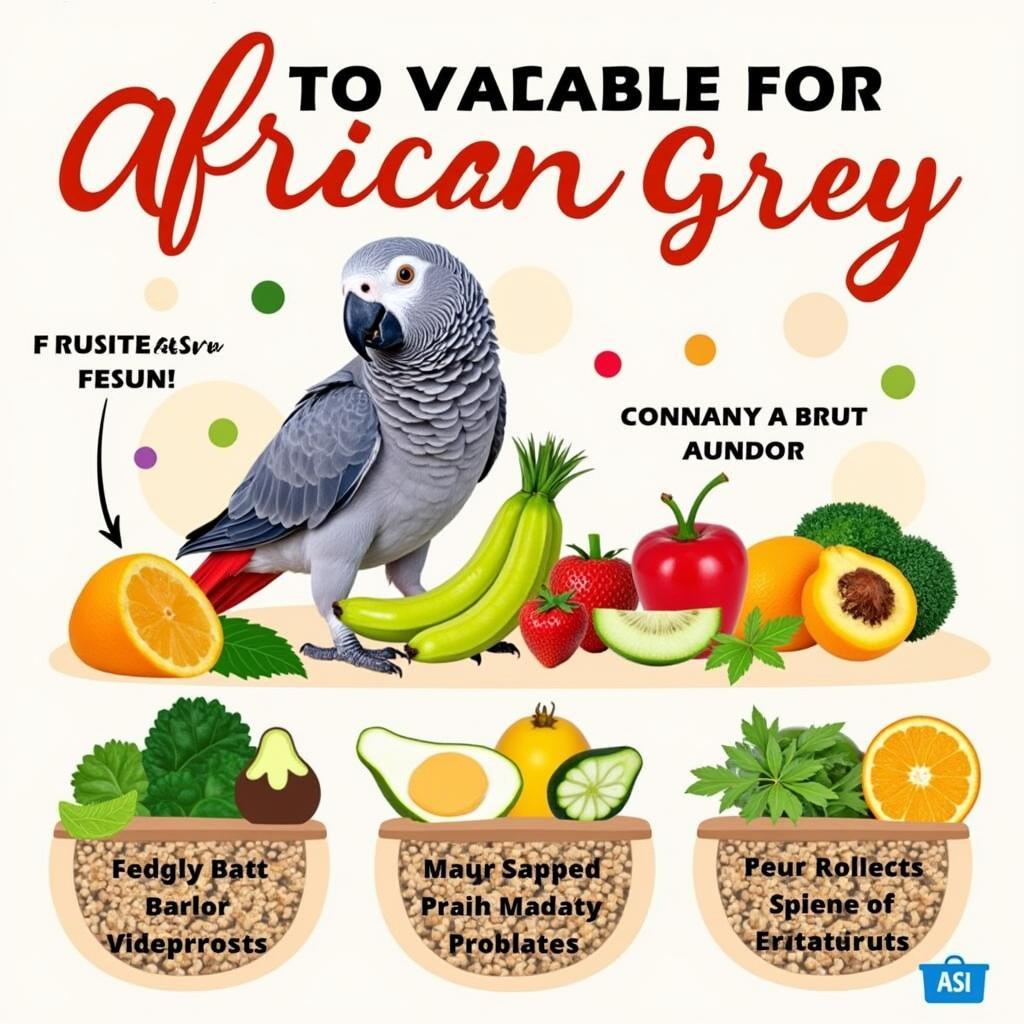African Grey Foods Not to Eat: A Comprehensive Guide
African grey parrots are intelligent and social creatures, and providing them with a proper diet is crucial for their well-being. Knowing which African Grey Foods Not To Eat is just as important as knowing what they should eat. An improper diet can lead to serious health issues, impacting their lifespan and quality of life. This guide will delve into the foods that should be strictly avoided to keep your feathered friend healthy and thriving.
Feeding your African Grey a balanced diet is key to their health and longevity. While they thrive on a variety of fruits, vegetables, and specialized parrot pellets, certain foods are toxic and can cause severe health problems. Understanding which foods are harmful is crucial for every African Grey owner. After getting your African Grey name generator, you need to focus on providing the best possible nutrition, which includes avoiding the harmful foods discussed in this guide.
Toxic Foods for African Greys
Some foods are outright toxic to African Greys and should never be given under any circumstances. These include:
- Avocado: Contains persin, a fungicidal toxin that can cause respiratory distress, heart failure, and even death in parrots.
- Chocolate: Theobromine and caffeine found in chocolate are highly toxic, affecting the central nervous system and heart.
- Caffeine: Found in coffee, tea, and some sodas, caffeine can cause hyperactivity, seizures, and heart problems.
- Alcohol: Extremely harmful to birds, leading to liver damage and potentially fatal alcohol poisoning.
- Onions and Garlic: These contain sulfoxides and disulfides which can damage red blood cells and cause anemia.
Foods to Limit or Avoid
While not as immediately toxic, these foods should be limited or avoided altogether due to potential health risks:
- High-Fat Foods: Excess fat can contribute to obesity and fatty liver disease.
- Salty Foods: Can cause dehydration and kidney problems.
- Sugary Foods: Contribute to weight gain and other health issues.
- Dairy Products: Parrots lack the enzyme lactase to digest lactose properly, leading to digestive upset.
- Apple Seeds: Contain cyanide, which is toxic in large amounts. Remove seeds before offering apples to your parrot.
- Fruit Pits (e.g., cherry, peach, apricot): These also contain cyanide and should be avoided.
 African Grey Parrot Enjoying Healthy Food
African Grey Parrot Enjoying Healthy Food
Why are These Foods Harmful?
Different foods pose different risks to African Greys. For instance, avocado contains persin, a toxin that can be lethal to these birds. Chocolate, coffee, and alcohol contain stimulants that their systems cannot handle. Onions and garlic can damage their red blood cells, while high-fat, salty, and sugary foods can lead to long-term health problems similar to those in humans.
What is the African grey weaning age? Knowing this will help you provide the appropriate diet. A proper cage setup is also vital. Check our African Grey cage setup tips for more information.
What Should You Feed Your African Grey?
A balanced diet for an African Grey should consist primarily of high-quality parrot pellets, supplemented with fresh fruits, vegetables, and healthy nuts. A good rule of thumb is for pellets to make up 70-80% of their diet, with the remaining 20-30% consisting of fresh produce and healthy nuts. This balance ensures they receive essential nutrients while also enjoying a variety of flavors and textures.
 African Grey Parrot Eating Pellets
African Grey Parrot Eating Pellets
Expert Opinion
Dr. Avian Care, a renowned avian veterinarian, emphasizes the importance of a balanced diet: “Providing a balanced and healthy diet is crucial for the long-term health and well-being of African Grey parrots. Avoiding toxic foods is paramount, and owners should focus on providing a varied diet rich in nutrients.”
What to Do If Your African Grey Eats Something Toxic
If your African Grey ingests something toxic, contact your avian veterinarian immediately. Time is of the essence in these situations, and prompt veterinary care can be life-saving. Do not attempt to induce vomiting or treat the bird yourself without professional guidance.
 Variety of Healthy Foods for African Grey
Variety of Healthy Foods for African Grey
More information about African food can be found on our page dedicated to African food items. The page provides insights into various food items from the African continent. Understanding the African food background can also be enriching.
Conclusion
Knowing which african grey foods not to eat is essential for responsible African Grey ownership. By avoiding the foods listed in this guide and focusing on a balanced, nutritious diet, you can ensure your feathered companion lives a long, healthy, and happy life. Providing a safe and nurturing environment, including a proper diet, is key to their well-being.
FAQ
- What are the most toxic foods for African Greys? Avocado, chocolate, caffeine, alcohol, and onions are among the most toxic.
- Can African Greys eat dairy products? No, parrots lack the enzyme to digest lactose and can experience digestive upset.
- What should I do if my African Grey eats something toxic? Contact your avian veterinarian immediately.
- What is the ideal diet for an African Grey? Primarily high-quality parrot pellets (70-80%) supplemented with fresh fruits, vegetables, and healthy nuts (20-30%).
- Are apple seeds safe for African Greys? No, apple seeds contain cyanide which can be toxic.
- Can African Greys have high-fat foods? High-fat foods should be limited to prevent obesity and other health problems.
- Why are onions and garlic bad for African Greys? They contain compounds that can damage red blood cells.
Common Scenarios
- Scenario 1: Your African Grey accidentally eats a small piece of chocolate. Contact your vet immediately, even if the amount seems small.
- Scenario 2: You’re unsure if a particular food is safe for your parrot. Err on the side of caution and avoid feeding it until you can confirm its safety with your veterinarian or a reliable source.
- Scenario 3: Your African Grey is showing signs of illness (lethargy, vomiting, changes in droppings). Consult your vet promptly as it could be related to dietary issues or other health concerns.
Further Exploration
You might be interested in learning more about specific nutritional needs or foraging activities for your African Grey. Our website offers resources on these topics and more.
Contact Us
For further assistance or any questions regarding your African Grey’s diet, please contact us at Phone Number: +255768904061, Email: kaka.mag@gmail.com or visit us at Mbarali DC Mawindi, Kangaga, Tanzania. Our customer support team is available 24/7.


